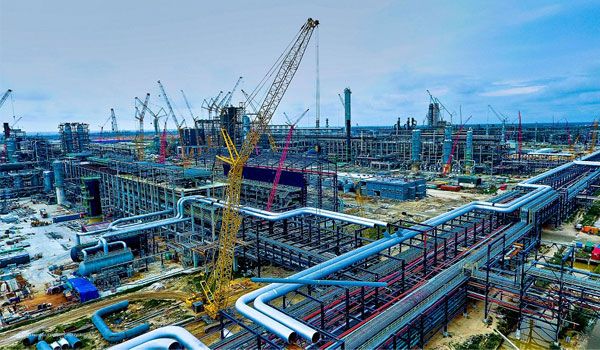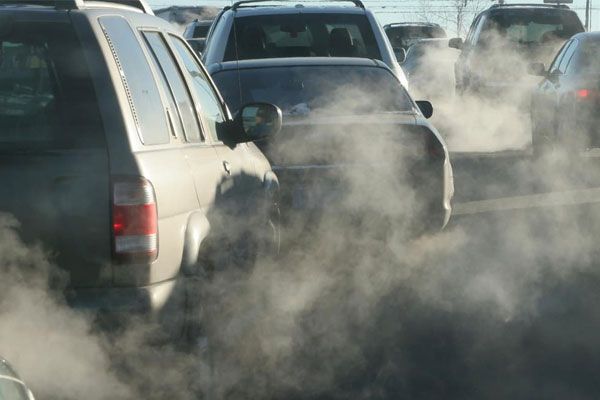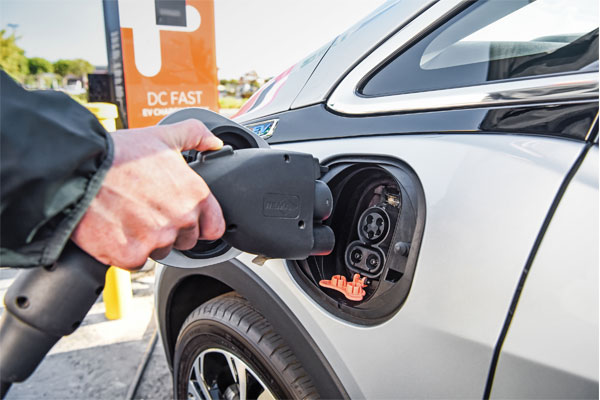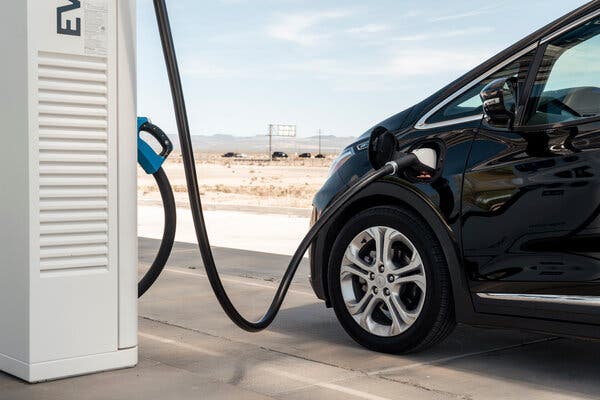General
While Nigeria Celebrates The Coming Of Dangote Refinery, See What Other Countries Are Doing

There is such a great expectation in Nigeria about the coming of the Dangote Refinery.
The Dangote Oil Refinery is a 650,000 barrels per day (BPD) integrated refinery project under construction in the Lekki Free Zone near Lagos, Nigeria. It is expected to be Africa’s biggest oil refinery and the world’s biggest single-train facility.
Meanwhile, as Nigerians await the delivery date of the Dangote Refinery, the rest of the world has made plans to move away from fossil fuel (petrol, diesel, etc.) as a means of powering automobiles.
-
READ ALSO: Wendy Okolo: Meet The Nigerian That’s The First Black Woman To Bag A PhD In Aerospace Engineering
The internal combustion engine ban, or simply, the ICE ban, is a term used to describe the gradual phase-out of vehicles that run on carbon-base fuel.
Several top car manufacturers have announced dates that they will discontinue the production of cars that run on carbon fuel.
For instance, by 2035, the European Union hopes to phase out the sale of petrol and diesel vehicles. Several other countries around the world have also made similar commitments. Many of these countries are considering imposing a diesel ban alongside a petrol restriction on new automobile sales.

A growing trend of countries moving away from petrol and diesel and toward cleaner, less expensive alternatives may be seen in the long list of countries aiming to prohibit fossil fuel cars.
To make plan more focused, these countries are signing to the COP26 declaration, a United Nations convention designed to midwife the acceleration of the transition to 100% zero emission cars and vans.
Anyway, listed below are the most recent petrol and diesel vehicles phase-out or car ban developments in several countries around the world.
Armenia
Armenia signed the COP26 declaration, vowing to work toward zero-emission vehicles for all new cars by 2040.
Austria
Austria signed the COP26 declaration, vowing to work toward zero-emission vehicles for all new cars by 2040.
Azerbaijan
Azerbaijan signed the COP26 declaration, vowing to work toward zero-emission vehicles for all new cars by 2040.
Belgium
Belgium signed the COP26 declaration, vowing to work toward zero-emission vehicles for all new cars by 2040.
British Columbia
British Columbia has enacted laws prohibiting the sale of new petrol vehicles by 2040.
Canada
Canada intends to phase out the sale of new petrol-powered cars and trucks by 2035, following the lead of Quebec.
Cape Verde
Cape Verde signed the COP26 declaration, vowing to work toward zero-emission vehicles for all new cars by 2040.
Chile
Chile has declared that by 2035, all new automobiles would be electric.
Croatia
Croatia signed the COP26 declaration, vowing to work toward zero-emission vehicles for all new cars by 2040.

Cyprus
Cyprus signed the COP26 declaration, vowing to aim toward zero-emission vehicles for all new cars by 2040.
Denmark
Denmark has proposed a 2030 ban on gasoline vehicles and a 2035 ban on hybrids, and has asked the European Union to expressly allow member states to adopt 2030 restrictions.
Egypt
Egypt is working on a plan to replace all gasoline vehicles with electric vehicles by 2040.
El Salvador
El Salvador signed the COP26 declaration on December 13th, vowing to work toward zero-emission vehicles by 2040.
Finland
Finland signed the COP26 declaration, vowing to work toward zero-emission vehicles for all new cars by 2040.
France
France intends to phase out petrol-powered automobiles by 2040.
Germany
The Bundesrat (upper chamber of parliament) passed a resolution requiring all new cars to be emission-free by 2030.
Iceland
Iceland plans to ban registration of new fossil fuel vehicles starting 2030; Reykjavik is eliminating half its petrol stations by 2025.
India
India set a target of 100% electric vehicles by 2030, and is considering a ban on petrol and diesel-powered 2- and 3-wheeled vehicles by 2025.
Ireland
Ireland legislation proposed to only allow sales of zero emissions vehicles starting 2030

Israel
Israel plans to ban sales of new gasoline vehicles after 2030
Japan
Japan plans to ban sales of new petrol vehicles by 2035.
Korea
Korea contemplating banning sales of new petrol vehicles by 2035
Liechtenstein
Liechtenstein signed the COP26 declaration pledging to work towards all new cars being zero emissions by 2040
Lithuania
Lithuania signed the COP26 declaration, vowing to work toward zero-emission vehicles for all new cars by 2040.
Luxembourg
Luxembourg signed the COP26 declaration, vowing to work toward zero-emission vehicles by 2040.
Malta
Malta signed the COP26 declaration, vowing to work toward zero-emission vehicles for all new cars by 2040.
Netherlands
The Netherlands, by 2030, all new cars must be emission-free; by 2030, all petrol/diesel vehicles will be banned from Amsterdam’s streets.
New Zealand
By 2040, New Zealand intends to restrict the sale of new petrol cars.
Norway
Norway intends to phase out petrol-powered vehicles by 2025. (currently, 60 percent of new car sales are electric)
Poland
Poland signed the COP26 declaration, vowing to work toward zero-emission vehicles for all new cars by 2040.
Portugal
Portugal intends to phase out the sale of new petrol vehicles by 2040.
Slovenia
Slovenia intends to prohibit the sale of new fossil-fuel automobiles by 2030.
Spain
Spain intends to restrict the sale of fossil-fuel automobiles by 2040.
Sri Lanka
Sri Lanka intends to eliminate all fossil fuel vehicles from the road by 2040.
Sweden
Sweden for example, intends to phase out the sale of gasoline cars by 2030.
Taiwan
By 2040, Taiwan intends to prohibit the sale of new non-electric automobiles. Dangote Refinery
Thailand
by 2035, Thailand, intends to phase out the sale of new petrol and diesel cars.
United Kingdom
The United Kingdom intends to phase out the sale of new petrol vehicles by 2032; Scotland intends to phase out the sale of new petrol vehicles by 2030.
Uruguay
Uruguay signed the COP26 declaration, vowing to work toward zero-emission vehicles for all new cars by 2040. Dangote Refinery
Cities Around The World
Amsterdam
After 2030, no internal combustion engine (ICE) vehicles will be permitted in Amsterdam’s city center.
Brussels
By 2035, Brussels intends to completely prohibit petrol or diesel vehicles from the city.
Bristol
Bristol could be the first city to prohibit diesel vehicles from entering the central business district.
Hong Kong
By 2030 or 2040, Hong Kong intends to phase out all diesel and petrol automobiles.
New Jersey
New Jersey officials announced in October 2020 that new petrol automobile sales would be phased out by 2035. S2252, which was authorized by the legislature in January 2020, sets a goal for electric vehicles to account for 90% of all new vehicle sales by 2040.
New York
New York S 9008 was introduced in the state senate on September 25, 2020, calling for all new automobile sales to be zero emission vehicles by 2035.
California
California Governor Gavin Newsom issued an Executive Order on September 23, 2020, mandating that the state stop selling new fossil fuel cars by 2035.
Colorado
In September 2020, Colorado Governor Jared Polis put forth a plan calling for “close to 100%” of vehicles on Colorado’s roads to be electric by 2050.
Hawaii
HB 2593, introduced in 2020, would prohibit the sale of fossil fuel powered cars starting 2030. SB 1338, introduced in 2019, would have phased out sales of new gasoline vehicles starting in 2030, but it did not advance.
Massachusetts
In January 2021, Massachusetts announced plans to follow California’s lead to ban sales of new petrol cars starting in 2035.
New Hampshire
SB 275, introduced in 2019, would require converting the state’s government fleet vehicles to ZEVs by 2039. Vetoed by Governor Sununu on June 25, 2019.
District of Columbia
DC Act 22-583, enacted January 2019, requires that public buses and privately owned fleet vehicles be Zero Emissions Vehicles by 2045. It passed into law in May 2019 as a $450,000 budget item to develop a plan for substantially converting the public fleet to electric by as early as 2025.


